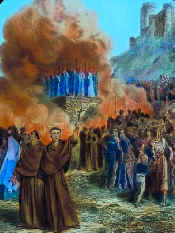A sign of times to come.

In my periodic trips around the area I have the misfortune of passing many of these fundamentalist asylums called churches.
These evangelicals like to have signs in front of their churches trying to recruit or pass on some sort of spiritual message. I passed one Baptist asylum and they had the following sign. It is supposed to have a deep message---and for Baptists this is about as deep as it gets---and some sort of spiritual meaning while be cute and showing them to be witty at the same time. It fails on all counts.
“It’s not what U do but why U do it”
I was aghast at what this implies. First, it really is a repudiation of basic morality which puts the focus foremost on what you do and secondarily on why you do it. The what is clearly more important than the why. The actions (the whats) are always more important the excuses (the whys). Take a spoonful of arsenic and you die and it does not matter one twaddle your reason for doing so. The what killed you regardless of the why behind it.
It is the “whats” that violate the rights of others not the “whys”. If someone mugs me my rights are violated even if they have a good reason for doing so. If mother needs new dentures robbing a bank is not justified. The what makes it immoral regardless of the why.
My first thought was that the principle this church was pushing really is meant to justify theocracy. It allows “God’s people” to be as vicious as they want because the viciousness (the what) is not as important as the reasons for the viciousness (the why). If they are violating rights to save souls then the why justifies the what.
Then I remembered that this is actually a very old Christian doctrine. A really vile Christian theologian by the name of Augustine wrote letters on this subject around 1600 years ago. Augustine was fighting a Christian sect called the Donatists. And he came to the conclusion that using force and violence against “heretics” was justified. Historian Perez Zagorin wrote of it, “The main point, he claimed, was not whether anyone was being forced to do something, but whether the purpose of doing so was right or wrong.” Or to put it in terms Baptists can understand: “It’s not what U do but why U do it.”
Augustine made his view very clear in a famous letter he wrote in 417 to Boniface. “There is an unjust persecution which the wicked inflict on the Church of Christ, and ... a just persecution which the Church of Christ inflicts on the wicked.” The same, act of persecution for religious beliefs, is thus moral when done by Christians and immoral when done by others.
The idea that there is such a thing as objective morality is not Christian. In fact the old Christian doctrine is that all morality is merely edicts issued by God. Killing is wrong only because God says it is wrong. If God commands it then refusing to kill is wrong. There really is no standard of morality at all everything depends of the whims of a deity. And since the deity doesn’t really exist and thus doesn’t issue orders the theologians, the preachers, the believers, are really not bound by any standard of morality but only by their own belief as to what a non-existent being wants them to do.
As long as they do awful things for glorious reasons then all is justified. The theologian John Robbins, a fundamentalist to the core, wrote:
“The distinction between right and wrong depends entirely upon the commands of God. There is no natural law that makes some actions right and others wrong....
This may be seen very clearly in God’s command to Adam not to eat the fruit of the tree of knowledge of good and evil. Only the command of God made eating the fruit sin. It may also be seen in God’s command to Abraham to sacrifice Isaac. God’s command alone made the sacrifice right, and Abraham hastened to obey. Strange as it may sound to modern ears used to hearing so much about the right to life, or the right to decent housing, or the right to choose, the Bible says that natural rights and wrongs do not exist: Only God’s command makes some things right and other things wrong.
...What makes murder wrong is not some presumed or pre-existing right to life, but the divine command itself."

1 Comments:
So true. Evil is evil regardless who sanctions it. Justification of immorality or immoral actions and thoughts will simply be judged by human history and God's judgement.
From my reading of the commandments, "Thou shall not kill" is not one of them. I do find "thou shall not murder". Though they appear to be the samething I think a wise person can parse the differences.
March 17, 2006
Post a Comment
<< Home